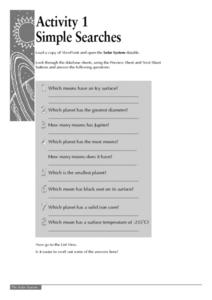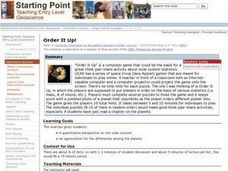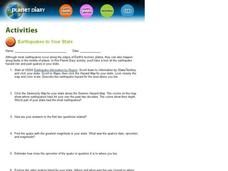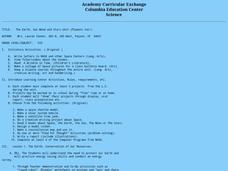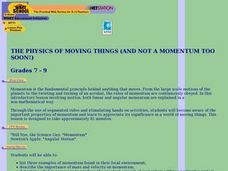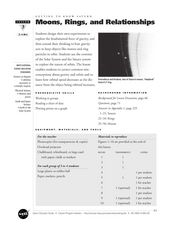Curated OER
Blue Planet: Frozen Seas
Students study the animals from the Arctic and how they have adapted. In this ocean lesson students create a poster about their given animal and present it to the class.
McGraw Hill
Gravity Variations Interactive
What would a baseball game look like on the moon? Probably a lot of home runs! A creative activity explores the motion of a projectile on the surface of different bodies in the solar system. Participants adjust the angle and velocity of...
University of Colorado
Enceladus, I Barely Knew You
Use spectral knowledge to make discoveries on a distant moon. Small groups gather information from images of one of Saturn's moons. The moon orbits within the E-ring made up of mainly water ice. Using information about the composition of...
Curated OER
Changes Inside Planets
Students investigate the concept of planetary differentiation. They complete an experiment to simulate it using gelatin and food. The lesson includes vocabulary to increase reading comprehension skills as part of the inquiry. The lesson...
Curated OER
Simple Searches
For this space worksheet, students load a copy of ViewPoint and open the Solar System datafile. There they look through database sheets, using the Preview Sheet and Next Sheet buttons and respond to 8 questions. Then students do some...
Curated OER
Solar System Lesson Plans
Solar system lesson plans provide teachers with a multitude of ways to interest even the most reluctant learners.
Curated OER
Order It Up!
Students use the game "Order It Up" an activity about the solar system statistics. The teacher is in the front of a classroom with an Internet-capable computer and a computer projector projecting the game onto the screen. Students have...
Curated OER
Two Views of the Universe
Students build the two models of the universe created by Aristotle and Copernicus. They compare and contrast the two universes. They create hypothesis on how each model functions.
American Museum of Natural History
A Closer Look at Mars
A website looks at how we know so much about Mars—telescopes, robots, and spacecraft—and the search for martian life. Following the informational text are three questions that quiz pupils about possible life on Mars.
Curated OER
Saturn’s Moons
Students compare Saturn's moons to the Earth's moon. In this moon lesson students work in groups and complete a lab activity then answer questions.
Curated OER
World In Motion Curriculum
Middle schoolers explore the night sky and its solar system. Using a Digitarium planetarium system, students observe four constellations. They discover the phases of the moon and eclipses. Middle schoolers recognize the difference...
Curated OER
Earthquakes In Your State
In this earthquake worksheet students complete an interactive activity then answer a series of short answer questions on different earthquakes and their magnitude, and epicenter.
Curated OER
The Earth, Sun, Moon, And Stars
Fifth graders explore the solar system. In this solar system unit, 5th graders investigate numerous projects while rotating through learning centers. Students write about space and construct a space shuttle model. Students practice map...
Curated OER
THE PHYSICS OF MOVING THINGS (AND NOT A MOMENTUM TOO SOON!)
Students list three examples of momentum found in their local environment; describe the importance of mass and velocity on momentum; and determine what is necessary to produce the greatest amount of momentum within a particular system.
Curated OER
"101 Amazing Earth Facts" Game
Students read for comprehension, work cooperatively to learn "101 Amazing Earth Facts," and compete as teams in a Jeopardy-like game.
Curated OER
The Universe
Students describe what scientists mean by an "expanding universe" in their own words. They explain how scientists comprehend the universie is expanding. Students comprehend the vast scale of the universe. They comprehend how theory...
Curated OER
The Loneliest Animals
Students examine the different species that are headed towards extinction. In this animal population lesson students compare the causes of extinction, research an endangered species and present an oral report.
Curated OER
Is There Liquid Water on Mars?
Students assess whether there is liquid water on Mars by analyzing images and data. In this planetary lesson students analyze temperature and pressure graphs and hypothesize about how water could have flowed on Mars.
Curated OER
Getting to Know Saturn: Moons, Rings, and Relationships
Learners identify the different objects that orbit Saturn. In this space science lesson, students plot the graph of orbital speed and distance. They explain why planets and asteroids remain in orbit around the sun.
DK Publishing
Stars and Planets Connect the Dots
Reach for the stars with this cute connect-the-dots activity! Kindergartners practice their counting and number sequencing by connecting the numbers 1 through 6 or 10 in four different shapes. A rocketship is completed for them as an...
Education Outside
Our Water Planet
Fresh water is a precious resource. Most kids don't realize how little of the water on Earth is actually drinkable. This lesson will help to illuminate them on this important topic. They discus the ratio of water to land, where most...
PHET
Energy Skate Park
Apply the concepts of conservation of energy to a skater to introduce a fun way the concepts apply to real life. Scholars build tracks, ramps, and jumps then analyze the various types of energy and friction. For an added challenge,...
Curated OER
El sistema solar
Everyone loves learning about space; there's something incredible about how all of this came to be, isn't there? Engage your Spanish language learners with this interesting topic. First, have each pupil cut out their vocabulary...
Baylor College
Modeling Earth's Atmosphere
Life on Earth is made possible by the unique composition of its atmosphere. Working collaboratively, a scale model is created as young scientists learn about the different layers of gas that surround the planet. Cards are included that...
Other popular searches
- Inner and Outer Planets
- Worksheets Planets
- Paper Mache Planets
- Inner Planets
- Nine Planets
- The Planets
- Imaginary Planets
- Sun and Planets
- Stars and Planets
- Planets Outer Space
- Planets and Astronomy
- Outer Planets






